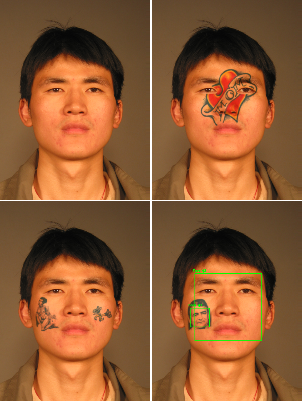Mathias Ibsen defended his Master Thesis on Impact of Facial Tattoos on Face Recognition Systems
Biometric systems are widely used for automated recognition of individuals based on their biological and behavioural characteristics. A popular biometric approach is face recognition which accurately and conveniently can recognise individuals based on face characteristics. Recent advances in deep learning techniques have meant that modern face recognition systems are able to use large face databases to learn complex representation of faces and as such have achieved good performance on several challenging data-sets. However, these state-of-the-art face recognition systems have shown to be vulnerable to different kind of face manipulations like plastic surgery, makeup and facial retouching. Therefore, facial tattoos are expected to have an impact on the performance of face recognition systems, but this is yet to be investigated.
The research in this thesis, therefore, investigates the impact of facial tattoos on face recognition systems. To do this, a categorisation of tattoos is defined and used to collect appropriate tattoo templates from different sources. Thereafter, different databases containing facial images with tattoos are created synthetically by blending tattoos to facial images without tattoos. The created databases, of facial images with tattoos, are used to evaluate the impact that facial tattoos have on face recognition systems by comparing the performance of the created databases on six different face recognition systems with the performance of the same facial images without tattoos.
Obtained results show that facial tattoos affect both the tested commercial and open-source systems, especially for facial images with high intensities of tattoos and when facial images with tattoos are compared to more unconstrained probe images without tattoos. Moreover, some of the tested face recognition and detection algorithms have shown to be particularly vulnerable to facial tattoos portraying human faces for which a significant performance drop was revealed compared to the baseline experiments.

